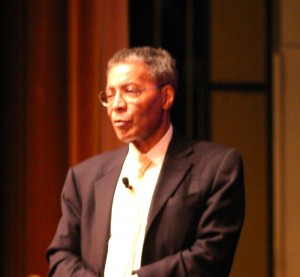After a somber and stormy Friday afternoon, Civil Rights figure and former script consultant for “The Cosby Show” and “A Different World” Dr. Alvin Poussaint illuminated Strong Auditorium for the University’s annual Martin Luther King, Jr. Day Commemorative Address. Students, faculty and locals alike gathered to watch the soft spoken Dr. Poussaint deliver a speech and presentation of his experience in the Civil Rights Movement.
Dr. Poussaint, who currently serves as the Professor of Psychiatry and Faculty Dean for Student Affairs at the Harvard Medical School, decided to focus the majority of his presentation on his experience as the Southern Field Director of the Medical Committee for Human Rights in Jackson, Miss. from 1965 to 1967. As the director, Dr. Poussaint provided medical care to civil rights workers and aided in the desegregation of public hospitals.
Audience members had the delight of seeing rare photos that Dr. Poussaint personally snapped while he was on duty at the Selma to Montgomery march and the Evers march across Miss. Some of his photos were candid shots of the man himself, Martin Luther King, Jr., relaxing with leis around his neck during a break.
“As you can see here, he’s giving me that look, thinking ‘now why are you taking a photo of me looking like this,’” Poussaint said, drawing a chorus of laugher from the crowd.
Dr. Poussaint not only shared a unique perspective of King the person, but also reflected on other contributing factors to and results of the Civil Rights Movement.
Poussaint argued that Stokely Carmichael’s mobilization of the Black Power movement later reciprocated into Latino, women and even LGBT pride movements.
The annual address ended in its traditional form — audience members were encouraged to ask questions in the middle of the aisles.
UR junior Christopher Norwood was one of the first students to present a question. Norwood, who is an aspiring educator, asked Poussaint about incorporating more technology into classrooms.
While Poussaint agreed about its necessity, he made sure there were no misunderstandings that he’s from the old school.
“You’re right, it is very important and it could certainly improve urban communities, but there are also a lot of inappropriate things out there that people have access to online,” he said. “And I know that when my nieces, nephews and grandchildren sit on the couch together, they spend the whole time texting to everyone. Sometimes they won’t utter a word to each other.”
While Poussaint was able to draw several laughs from the audience throughout his 45 minute presentation, his trip up to the arctic lands of Rochester was no easy task.
The Office of Minority Student Affairs had originally arranged for him to speak with a select group of students leaders at 3:30 p.m. — similar to what last year’s speaker, the reverend Joseph Lowery, did in the Gandhi Reading Room when he visited. However, heavy snow and wind chills delayed his trip.
But that did not stop UR junior and Black Students’ Union Vice President Ian Feurtado from enjoying Poussaint’s visit. Feurtado had the opportunity to introduce the keynote speaker for his second consecutive year — an opportunity that Feurtado says he will not take for granted.
“The opportunity to introduce Dr. Poussaint is one that I will treasure for the rest of my life.” Feurtado said. “I believe that when you are in the position to be inspired, you start to believe that you are capable of changing the world. Not only do you witness the accomplishments of an important historical figure, but you identify yourself with that person realizing that you have to continue to carry the torch.”
Poussaint isn’t a figure that is completely clear of past controversies.
However, political science professor Valeria Sinclair-Chapman noted that Poussaint was an interesting selection for the keynote address — especially considering his controversial co-authored book with Bill Cosby, “Come on People.”
“The premise of the book was met with skepticism by many, and, as a result, Poussaint is now viewed ambivalently by many blacks,” Sinclair-Chapman said. “As it turns out, Poussaint’s candid photos and perspectives on the Selma to Montgomery march and the Evers march across Mississippi were engaging, nuanced and informative, and his remarks were relatively uncontroversial.”
The MLK address was a timely one for the campus community. Just hours before Dr. Poussaint’s message, students and faculty filled UR Transportation busses to Aenon Missionary Baptist Church to pay respects to Jeffery Bordeaux, Jr. and his family at a morning service. Bordeaux’s services proved to be an uplifting celebration of his trademarked humor and generosity.
Poussiant’s address was a positive change of pace for the prevalent mix of emotions on the River Campus.
“I think it was appropriate for us to celebrate Dr. King and his message of strong communities at this time of recovery,” junior Alykhan Alani said. “Most of us who were at the service were able to have lunch and dinner together before attending Poussaint’s address.”
Nathaniel is a member of the class of 2011.





